Those who drink alcohol have probably had a night where a few drinks left them feeling drowsy. Alcohol is a depressant, which means it may help one fall asleep faster. However, it can affect the quality of our sleep, and not in a good way.
In 2013, researchers reviewed 20 studies centered on alcohol and sleep for an overarching look at the detrimental impacts of alcohol on nighttime rest. “This review confirms that the immediate and short-term impact of alcohol is to reduce the time it takes to fall asleep,” Irshaad Ebrahim, director of the London Sleep Center and lead author of the review, said in a statement. “In addition, the higher the dose, the greater the impact on increasing deep sleep.”
The review also found that alcohol reduces the time spent in REM sleep. “In sum,” said Chris Idzikowski, director of the Edinburgh Sleep Centre, “alcohol, on the whole, is not useful for improving a whole night’s sleep. Sleep may be deeper to start with, but then becomes disrupted. Additionally, that deeper sleep will probably promote snoring and poorer breathing. So, one shouldn’t expect better sleep with alcohol.” More recent research showed similar findings on the negative effect of alcohol on overall sleep quality.
This piece will cover all the different ways alcohol affects sleep, from decreasing the amount of time spent in REM sleep to upping our risk of obstructive sleep apnea. It will also touch on how hangovers can affect sleep and the links between alcohol use disorder and sleep.
Finally, our alcohol and sleep guide will offer resources for anyone who wants to learn more about how alcohol affects sleep, as well as resources for anyone concerned about their drinking or seeking assistance for alcohol use disorder.
Jump To
Breathing Problems | REM Sleep | Brain Patterns | Dreams | Alcohol Addiction | Resources | FAQs
Alcohol Can Cause Nighttime Wakeups
Because alcohol is a diuretic, people may wake up more often to go to the bathroom during the night if they have been drinking. Alcohol actually decreases how much antidiuretic hormone the body produces, causing lowered reabsorption of water. So, our kidneys kick into gear and our body loses more fluid through urination. After a night of drinking, people may wake up needing to go, even if their bladder doesn’t typically bother them at night.
Another issue? Alcohol may affect one’s circadian rhythms, leading to nighttime wakeups and difficulty sleeping. A 2019 study found that drinking alcohol disrupted circadian rhythms. In a sample of high school age participants with alcohol abuse problems, the study found that their circadian rhythms were disrupted through increased usage of alcohol.
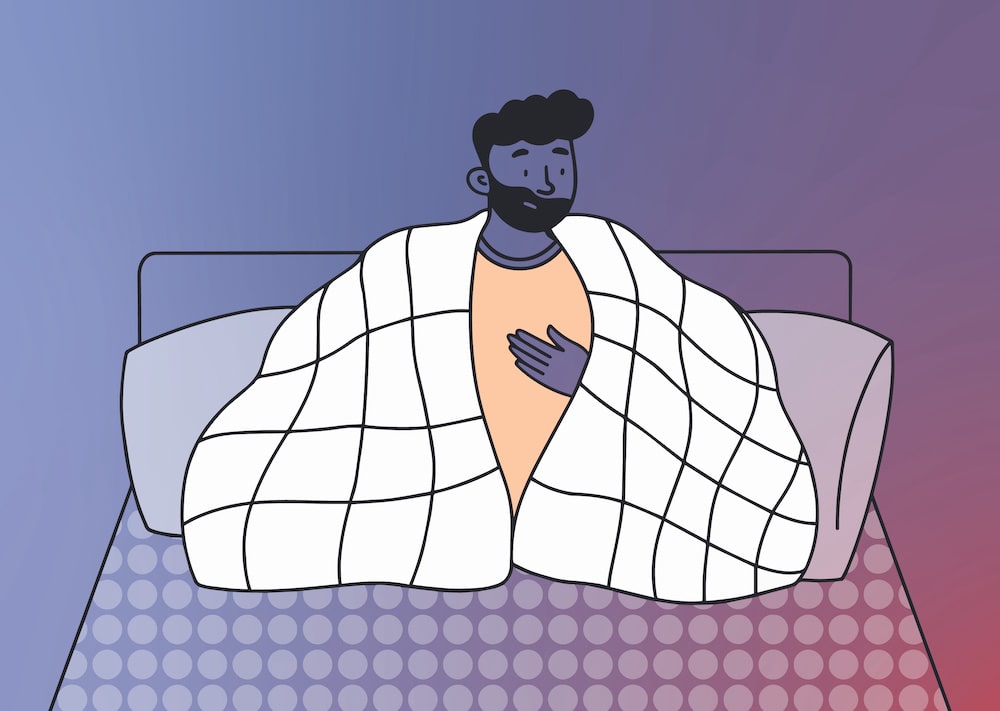
Alcohol is Linked to Breathing Problems During Sleep
Alcohol may decrease one’s muscle tone, including the tissue in the airways. This can make things like sleep apnea and snoring significantly worse. Sleep apnea is a condition that causes one’s breathing to stop and start during sleep, and there are three different types.
The most common form of sleep apnea is obstructive sleep apnea, which occurs “when your throat muscles intermittently relax and block your airway during sleep,” the Mayo Clinic says. There is also central sleep apnea when the brain does not send the right signals to the muscles that control breathing during sleep. The third form of sleep apnea is complex sleep apnea, a combination of obstructive and central sleep apnea.
The symptoms of obstructive sleep apnea (OSA) include:
- Excessive daytime sleepiness
- Loud snoring during sleep
- Abruptly waking up while gasping or choking
- Episodes where breathing stops during sleep
- Waking up with a sore throat or dry mouth
- Trouble concentrating
- High blood pressure
- Night sweats
- Decreased libido
- Headaches in the morning
- Mood changes, like feeling anxious or depressed
There are a number of factors that can increase one’s risk of obstructive sleep apnea, including excess weight, a narrowed airway, a thicker neck circumference, smoking, nasal congestion, a family history of the condition, and drinking alcohol or taking sedatives.
For a February 2018 review of the literature published in the journal Sleep Medicine, researchers examined 21 studies about alcohol and OSA. The review suggested that people who drink alcohol have a 25% higher risk of obstructive sleep apnea than people who do not.
The authors of the study called for further research into the issue, noting that there are no randomized, controlled trials examining the connection between sleep apnea and alcohol intake. Furthermore, they said that how much alcohol we drink and what time we drink it is likely relevant to an increased risk of obstructive sleep apnea.
“It appears… likely that the timing and regularity of alcohol consumption are both important to the effect of alcohol on OSA, since airway muscle relaxation and reduced sensitivity to apnea are both likely to be greatest when alcohol levels are rising, as for example after bedtime consumption,” the authors wrote.
There are a number of treatments available for obstructive sleep apnea. One is a continuous positive airway pressure machine (CPAP), which is a mask one wears during sleep. “In this treatment, a machine delivers air pressure through a piece that fits into your nose or is placed over your nose and mouth while you sleep,” the Mayo Clinic says. Other treatment options include nasal masks and surgery to remove excess tissue.
For those who are concerned that they may have obstructive sleep apnea, and that drinking alcohol worsens it, speak with a doctor about any worries. A physician can make a diagnosis and work with them on a treatment plan, which may or may not include cutting back on alcohol consumption.
RELATED: Best Earplugs for Sleeping
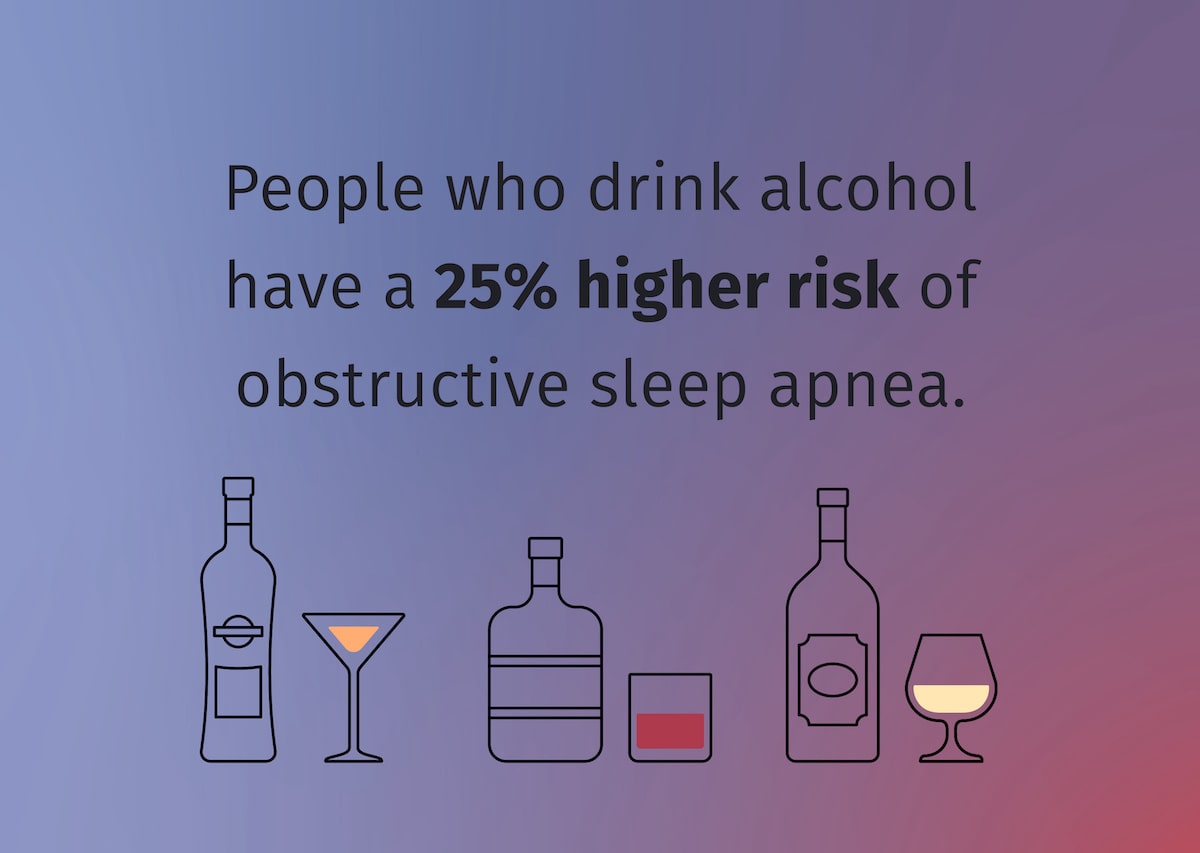
Alcohol Likely Interferes With REM Sleep
Research suggests that REM sleep is associated with learning and memory consolidation, and it’s considered incredibly important. As the Cleveland Clinic explains, there are two different sleep states: rapid eye movement sleep (REM) and non-rapid eye movement sleep (NREM). We cycle through sleep stages multiple times over the course of the night.
RELATED: The Complete Guide To Your Sleep Cycle
NREM sleep happens first, and there are four different stages of NREM sleep. Stage 1 is the lightest sleep stage, and Stages 3 and 4 are deepest. After Stage 4 we move into REM sleep, usually about 90 minutes after we have fallen asleep. Our first period of REM sleep lasts about 10 minutes and gets increasingly longer as we move through sleep cycles during the night.
“REM sleep is a stage of sleep that is characterized by low muscle tone, rapid eye movements, and dreams,” the American Sleep Association says. “It is present in all mammals and has unique physiologic properties that distinguish it from non-REM sleep.”
According to the National Institute of Neurological Disorders and Stroke, our brain activity during REM sleep is “closer to that seen in wakefulness” and our heart rate and blood pressure “increase to near waking levels.” The institute says that successful memory consolidation probably requires a mixture of both REM and non-REM sleep.
Drinking Can Disrupt Brain Patterns
For a 2015 study, researchers looked at the brain activity of 24 healthy Australian subjects aged 18-21 on nights when they were given alcohol and orange juice before bed compared to nights when they received a placebo drink before bed. The subjects slept at the Melbourne School of Psychological Sciences Sleep Laboratory, where their brain activity during sleep was measured using an electroencephalogram (EEG).
The study found that, on nights where subjects had drunk alcohol, they experienced more slow-wave sleep patterns and something called delta activity, which is related to restoration and healing. But people in the study also had heightened alpha wave patterns at the same time as the delta wave patterns.
Alpha waves are usually observed when someone is awake, but resting. These two types of waves occurring together can offset each other, causing less restful sleep. TIME reports: “In previous studies, such warring alpha-delta brain patterns during sleep have been linked to daytime drowsiness, waking up not feeling rested, and symptoms such as headaches and irritability.”
These results suggest potential long-term impacts. “Similar increases in alpha-delta activity, which are associated with poor or unrefreshing sleep and daytime function, have been observed in individuals with chronic pain conditions,” study author Christian L. Nicholas, National Health & Medical Research Council Peter Doherty Research Fellow in the Sleep Research Laboratory at The University of Melbourne, told Science Daily. “Thus, if sleep is being disrupted regularly by pre-sleep alcohol consumption, particularly over long periods of time, this could have significant detrimental effects on daytime wellbeing and neurocognitive function such as learning and memory processes.”
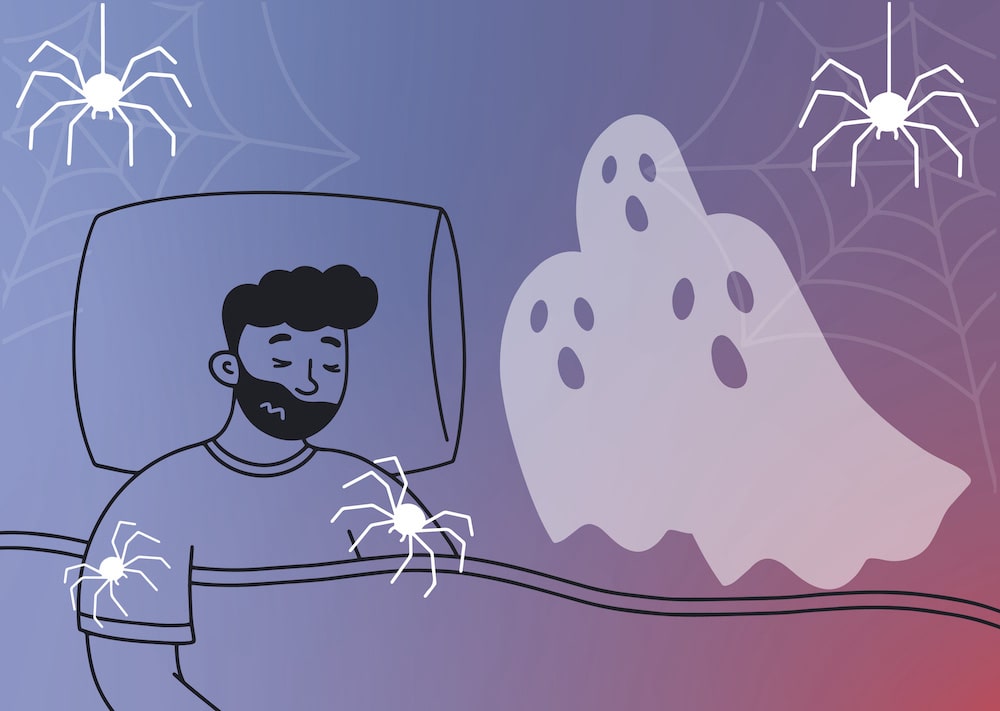
Alcohol Can Affect Dreams, Too
The Cleveland Clinic explains that alcohol is linked to experiencing vivid dreams or nightmares. According to BBC Science Focus, this happens because alcohol causes shallow sleep and more frequent wakeups — meaning one is more likely to remember their dreams.
“Alcohol also similarly affects the body’s temperature; causing your body’s temperature to dip slightly, then rise, alcohol-spurned irregularities can contribute to nightmares the same way fevers do,” Medical Daily says.
Dreams may also be affected when someone gives up drinking. If someone is going through alcohol withdrawal — defined by MedLine Plus as “symptoms that may occur when a person who has been drinking too much alcohol on a regular basis suddenly stops drinking alcohol” — they can experience nightmares or vivid dreams. Withdrawal symptoms typically last for a few days but can stretch on for weeks in some cases. “Alcohol withdrawal can be lethal. Make sure to discuss limiting alcohol under supervision with your healthcare professional,” Dr. Kristen Casey, a licensed clinical psychologist, tells Mattress Clarity.
Hangovers may interfere with sleep, too.
Drinking at nighttime isn’t the only thing that can affect one’s sleep when it comes to alcohol. If someone experiences a hangover, that can also affect how tired they feel and potentially interfere with their sleep schedule and energy levels.
According to the Mayo Clinic, fatigue is an extremely common hangover symptom that people experience after a bout of drinking. Other symptoms include:
- Excessive thirst
- Headaches
- Nausea
- Vomiting
- Diarrhea
- Sensitivity to light and/or sound
- Dizziness
- Anxiety
- Poor or interrupted sleep
Increased fatigue from a hangover may prompt napping during the daytime, which could interfere with one’s ability to fall asleep and stay asleep that night. If someone does feel hungover, Harvard Health says, make sure to drink plenty of water. The site also recommends drinking some coffee or tea for a jolt of caffeine, which can help combat fatigue and banish grogginess.
When Should Someone Stop Drinking Before Bed?
There’s no singular, hard and fast rule about when we should stop drinking before bedtime — but experts agree that we should give ourselves some time to metabolize drinks before going to bed for the night. One very general rule of thumb is to have one’s last alcoholic drink two to three hours before going to sleep in order to avoid alcohol-related sleep disruptions.
The time it takes someone’s body to break down alcohol depends on a number of different things, including body weight, liver function, liver size, sex, and genetics. All of these factors help determine how much alcohol will intoxicate someone, and also play a role in how quickly they can sober up after drinking.
If someone metabolizes alcohol very fast, they may find it no problem to have a drink much closer to bedtime. But generally speaking, while a nightcap may seem like a great idea to help one fall asleep, it may actually negatively affect one’s sleep over the course of the night. It’s best to give oneself a buffer between drinking and going to sleep whenever possible.
As part of a healthy sleep hygiene routine, plan to stop drinking at least 2 hours before going to bed. This gives plenty of time to complete a nighttime routine, which will help cue the body that it’s time to go to sleep.
Options for a soothing bedtime routine include taking a warm bath, drinking a cup of herbal tea, dimming bedroom lights, reading, listening to music, meditating, or stretching. We should also avoid looking at electronic screens for an hour before bed, in order to facilitate the release of a hormone called melatonin that helps tell our body it’s time to sleep.
RELATED: Best Mattresses
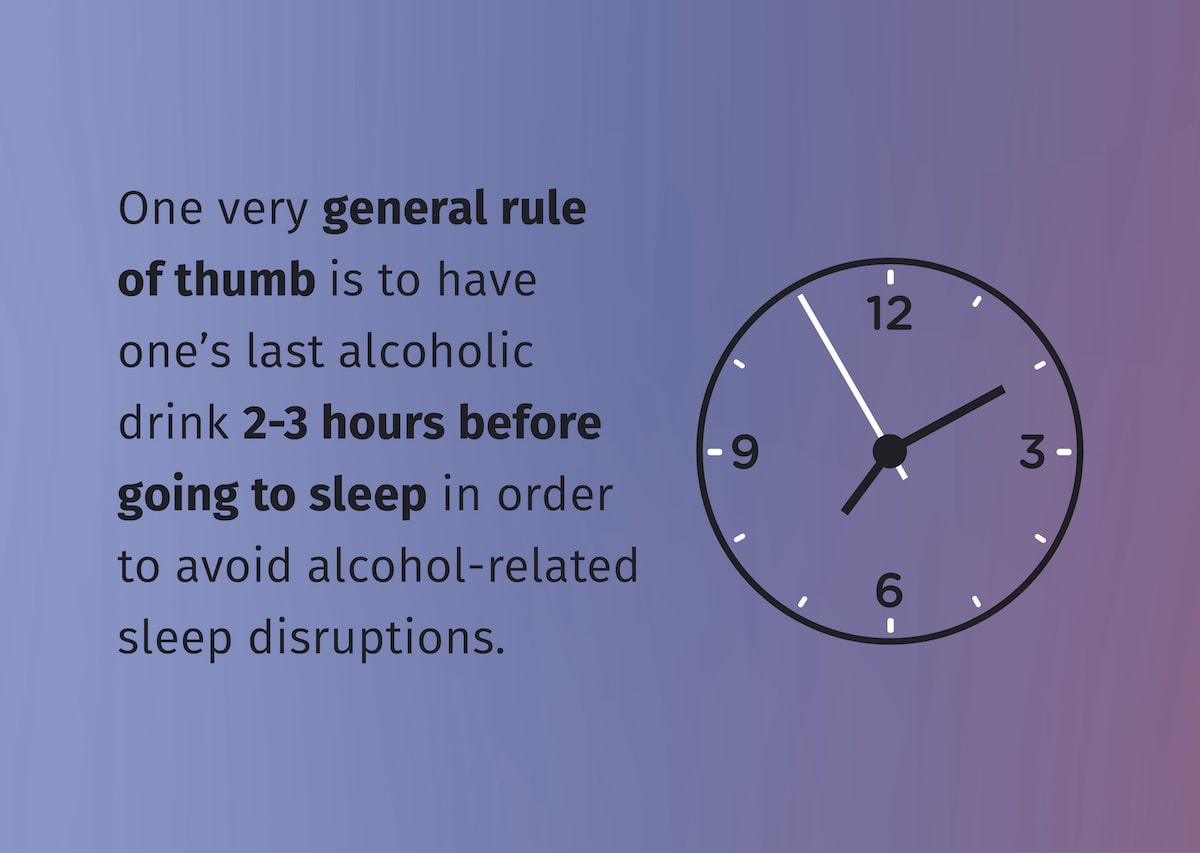
Signs Our Sleep Is Taking A Hit
Sometimes it can be difficult to figure out what is causing various problems with one’s sleep. Plus, everyone handles alcohol differently, so some people may be seriously affected while others may not be. One helpful tool is to track our sleep for a while and compare our sleep on nights when we have consumed alcohol to our sleep on nights when we have not.
There are a number of available options for tracking our sleep. One option is a wearable sleep tracker, like one built into a smartwatch. These trackers use the accelerometer within the smartwatch to track when one is asleep, restless, and awake. They can also estimate how long we spend in different stages of sleep, though their accuracy is questionable — the only truly accurate way to measure sleep stages is using an EEG to track our brain waves.
Some smartphone apps can also track our sleep, for example when kept under your pillow or at the corner of your bed to record our physical movement during the night. And of course, there is always the good old-fashioned method of writing down any observations about your sleep after waking up the next morning. You can note down your bedtime, what time you woke up in the morning, any times you woke up during the night, if you needed to go to the bathroom during the night, and anything unusual you remember about that night’s sleep.
Once someone has been tracking their sleep for a while, they can compare their sleep on nights when they have consumed alcohol to nights when they have not. Do they sleep for longer or shorter when they have been drinking? Does their tracker estimate that they get less REM sleep? Do they note feeling groggier or more irritable the next day? The answers to these questions can help them gauge how alcohol affects their rest.
Binge Drinking And Sleep Loss
Even a single night of binge drinking can impair a person’s ability to enjoy quality sleep for up to two days afterward. That’s the conclusion of a 2018 study out of the University of Missouri-Columbia. We talked to the study’s lead author, Mahesh Thakkar, Ph.D., professor and director of research at the MU School of Medicine’s Department of Neurology, to learn more about how alcohol might influence sleep quality.
The study found that binge drinking (which is defined as a drinking session that elevates a person’s blood alcohol concentration, or BAC, to 0.08 or above) can inhibit sleep quality in multiple ways: First, by affecting the gene that impacts for sleep. And secondly, by interfering with levels of the chemical adenosine in the brain, which can further inhibit quality rest. While previous studies have made a connection between binge drinking and poor-quality sleep, this research (which was conducted on mice) is unique in that it helps explain why drinking to excess can interfere with people’s ability to enjoy sufficient rest.
“We have shown that a single session of binge alcohol drinking reduces the expression of a gene that regulates sleep,” Thakkar told Mattress Clarity via email. Given that the Centers for Disease Control and Prevention (CDC) estimates that one in six American adults binge drinks approximately four times per month, these findings may have important implications regarding the relationship between alcohol consumption and sleep quality.
Why Binge Drinking Might Interfere With Sleep
The researchers conducted their experiment on mice to simulate the experience of binge drinking in humans. The mice were exposed to binge drinking and then had their sleep monitored.
The study authors observed that those mice who underwent binge drinking experienced an increase in non-rapid eye movement (REM) sleep in the four hours after the drinking binge. This non-REM sleep was followed by a period of wakefulness that decreased the amount of sleep the subjects experienced overall.
The researchers determined the mice weren’t sleeping well for two primary reasons:
- First, the high quantity of alcohol affected the gene that typically regulates sleep, which contributed to the mice’s inability to sleep soundly for a sufficient period. “While we are still working on understanding how long the effects (on gene expression) last, we know for sure that the effect remains for two days,” said Thakkar.
- Secondly, mice who experienced an alcohol binge demonstrated altered levels of the chemical adenosine in the brain. This chemical typically rises prior to sleep, then drops during sleep before rising again to promote wakefulness. Thakkar says this pattern was disrupted by binge drinking, which may further explain why drinking to excess interferes with sleep.
Even though the study was conducted on mice, Thakkar believes the results would likely apply to humans as well. “We believe so because humans who binge drink show similar sleep disturbances during [the] second half of [the] sleep period,” he said.
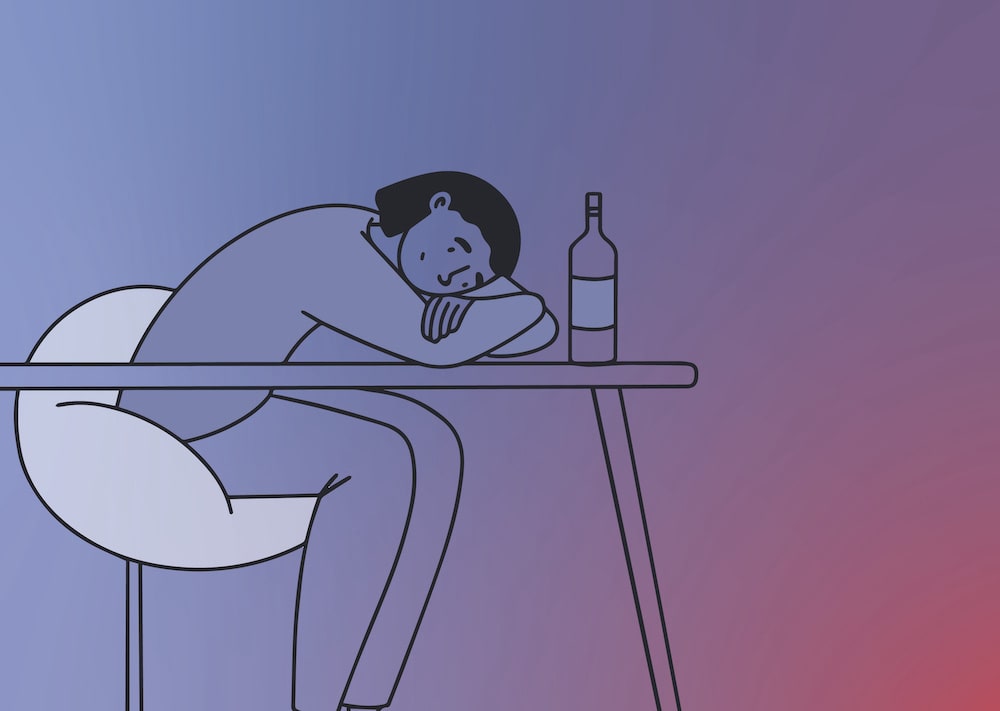
Alcohol Addiction And Sleep
Alcohol addiction is extremely common. The National Institute on Alcohol Abuse and Alcoholism (NIAAA) estimates that 6.2% of adults over 18 suffer from alcohol use disorder, defined as “a chronic relapsing brain disease characterized by an impaired ability to stop or control alcohol use despite adverse social, occupational, or health consequences.”
The Mayo Clinic says that alcohol use disorder is “a pattern of alcohol use that involves problems controlling your drinking, being preoccupied with alcohol, continuing to use alcohol even when it causes problems, having to drink more to get the same effect, or having withdrawal symptoms when you rapidly decrease or stop drinking.”
According to the NIAAA, people suffering from alcohol use disorder may have a number of sleep issues. These include:
- Taking much longer to fall asleep
- Waking up more frequently
- Having more low-quality sleep, leading to an increase in daytime fatigue
These issues can continue even after someone with alcohol use disorder stops drinking alcohol. “Despite some improvement after withdrawal subsides, sleep patterns may never return to normal in those with alcoholism, even after years of abstinence,” the NIAAA says.
Some people with alcohol use disorder may need to undergo a detox, which can be very dangerous and is best done under the supervision of medical professionals. Some people with an alcohol addiction who give up drinking will go through withdrawal, described by Harvard Health as “the changes the body goes through when a person suddenly stops drinking after prolonged and heavy alcohol use.” Common alcohol withdrawal symptoms include tremors, anxiety, fatigue, nightmares, and insomnia.
MedLine Plus says that alcohol withdrawal symptoms typically peak within 24-72 hours, but can last for weeks in some instances. Those who experience any long-lasting symptoms after quitting alcohol should speak to their doctor about what’s going on and what they can do about it.
The NIAAA stresses that alcohol use disorder can be successfully treated, no matter how severe the problem is or how long it has been going on. Treatment options are far-ranging, from support through formal networks like Alcoholics Anonymous to in-patient programs, counseling, spiritual practices, and mental health treatments. Those who believe they are suffering from alcohol use disorder should speak to a doctor about the best way to approach treatment.
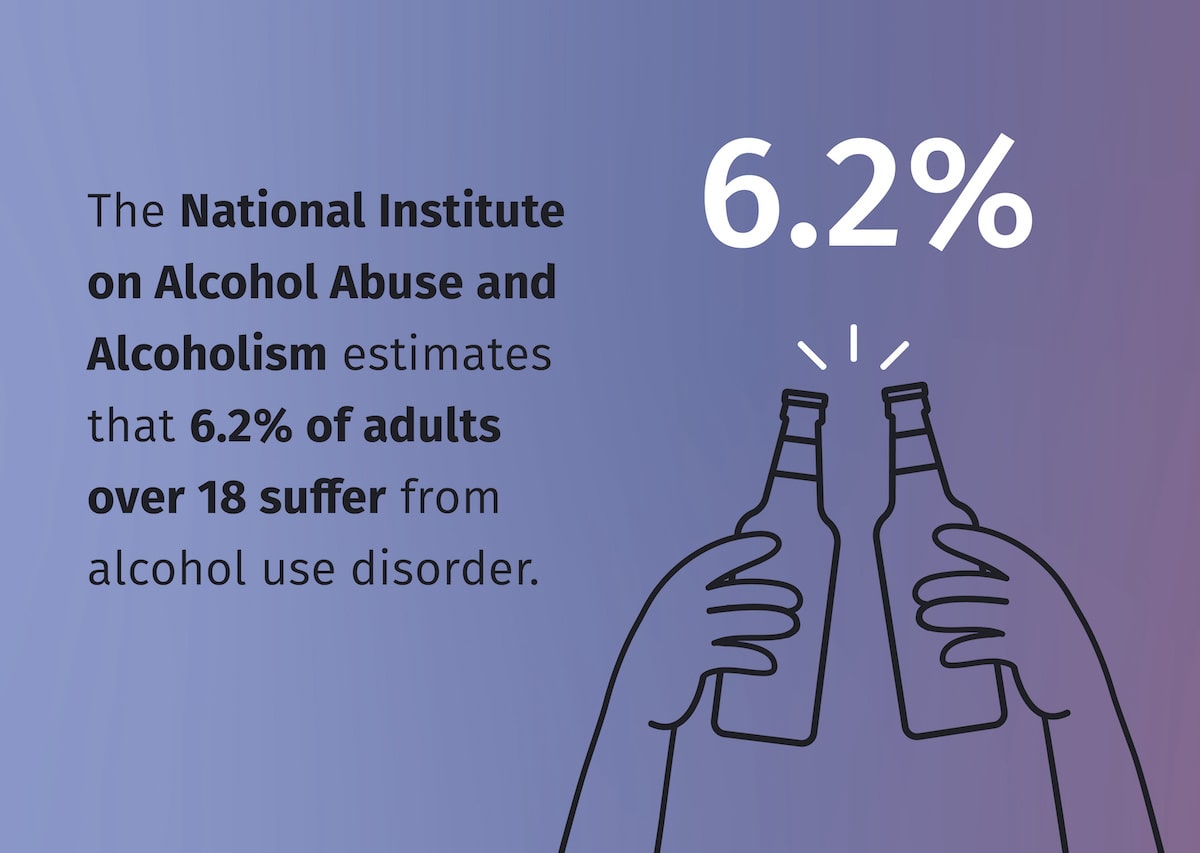
The Bottom Line
Consuming alcohol can affect our sleep in a number of ways. It can shorten the time it takes us to fall asleep, shorten the duration of REM sleep, increase the risk of obstructive sleep apnea, contribute to nighttime wakeups, contribute to vivid dreams and nightmares, and play a role in daytime fatigue due to poor sleep and hangover symptoms.
It’s hard to say how much alcohol will affect any given person’s sleep, given that alcohol tolerance and metabolism vary greatly from person to person. One good rule of thumb is to stop drinking alcohol at least two hours before going to bed each night. Tracking our sleep on nights when we drink and nights when we do not drink can help us figure out if alcohol is negatively affecting our sleep.
Those who are suffering from alcohol use disorder are not alone. The condition can definitely affect sleep by making it harder to fall asleep, contributing to frequent wakeups, and contributing to daytime fatigue. Those who believe they are suffering from alcohol use disorder and want to seek help have plenty of options. They can speak to a physician about their recommended treatments, and approach a local support group or online network for important peer support. For more information, check out the resources listed below.
Resources
- Find Treatment — Substance Abuse and Mental Health Services Administration
- Alcohol Use Disorder — Mayo Clinic
- Alcohol and Fatigue — Harvard Health
- Why You Should Limit Alcohol Before Bed for Better Sleep — Cleveland Clinic
- Start Your Recovery — Substance Abuse Resources and Support
FAQs
Does alcohol help you sleep?
Alcohol may make it easier to fall asleep, but it doesn’t improve sleep quality. In fact, it can make our sleep more restless and can decrease our time spent in deep sleep stages.
Can you drink alcohol and take a sleeping pill?
No, mixing alcohol and sleeping pills is dangerous. Both of these drugs are depressants, meaning they slow the nervous system. The combination of alcohol and sleeping pills can lead to memory loss, overdose, and even death.
Does alcohol increase heart rate while sleeping?
Alcohol increases heart rate temporarily. This happens while we are sleeping because of binge drinking or consuming alcohol close to bedtime.
Does alcohol lower blood pressure during sleep?
Consuming more than three drinks in one sitting raises blood pressure. Regular binge drinking can increase blood pressure in the long term, posing serious health concerns.
Which stage of sleep is most disrupted by alcohol?
Alcohol reduces REM sleep, which is important for memory and learning, and results in fragmented sleep. The impact of alcohol on REM sleep depends on how much was consumed.

